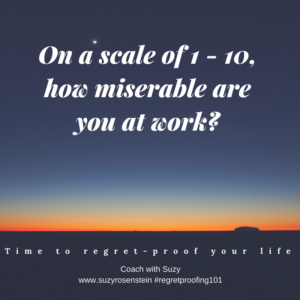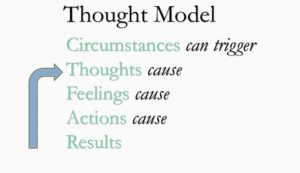It can be pretty frustrating to be miserable at work.
Midlife misery loves company, so…let’s have an honest talk about that job of yours that looks fantastic on paper.
You know which one I’m talking about, right?
- the job with amazing benefits
- the job with more paid vacation than you’ve ever had before
- the job with a steady salary you love
- the job that satisfies your need for stability
Yes, my friends. That job.
I wonder if you’re sitting at your miserable desk at your miserable job right now, reading this post. Maybe you’re also in your miserable office with your own door. Or maybe a miserable cubicle?
Regardless, I bet you feel like you’re wasting time at this miserable job.
You probably feel like you’re just going through the motions too and not really present.
You might even feel stagnant.
Like you’re just not going anywhere.
Like something’s missing.
I bet you’ve started to think about making a change.
But you’re confused. So you don’t.
You’re feeling some fear of the unknown.
And you don’t know exactly what you want.
You think to yourself, “how could I possibly make a change when I have such a good, stable job that has great benefits and a nice salary?”
That thought is usually followed by, “what’s wrong with me?” and maybe a dash of, “I’m only 14 years (or whatever it is for you) from retirement…if I could just hold on…”
 And then you feel more confused, more self-indulgent, more frustrated.
And then you feel more confused, more self-indulgent, more frustrated.
And you’re right back into the spin-cycle.
I used to play a little game with myself when I was miserable at work. I would think about where I was on the“scale of misery,” from one to 10.
I would rationalize that as long as my level of misery was under five on the scale, I should just work on my coping skills and suck it up.
It’s important to ask yourself WHY you’re miserable, not just talk about how miserable you are.
My life coaching clients tell me the following reasons they’re miserable on a pretty consistent basis. See if any resonate with you:
- their boss gives them bad reviews
- their boss is less qualified that they are
- their financial compensation is lower than industry standard
- they’re not as productive as before
- they’ve been reorganized to death and their job isn’t the same as before
- they have too much responsibility and they’re working more than ever
- they’ve been there a long time and aren’t growing any more
Pretty good reasons for feeling miserable, right?
As a causal coach, and in the words of John Pinette, I have to say “nay nay.”
Just like your job, these reasons look good on paper but aren’t the real reason you feel miserable.
I would like to suggest that you think about things is in a more mindful way with more perspective on your thinking. The thought model I’ll be referring to is this one, taught by Brooke Castillo of The Life Coach School.

Every situation has “facts” and “thoughts about the facts.” Facts – or circumstances – are neutral. If you had 10 people in a room, everyone would agree about the facts. They’re black and white. They can be proven.
On the other hand, “thoughts” are sentences in your mind ABOUT the facts. They are subjective. They are opinions. They are personal to you. Ten people in a room wouldn’t necessarily agree on a thought about a fact. Let’s look at these reasons for feeling miserable.
- Boss gives you bad reviews – This is a THOUGHT. A completed review is factual. Neutral. It’s what we think about the review that creates the problem. A review is a FACT. It doesn’t make you feel bad. But thinking it’s a BAD REVIEW – that’s a THOUGHT. It’s what you THINK about your completed review that’s the problem.
- Financial compensation is less than industry standard – This is a FACT. There is an actual number that represents industry standard and a number that is the financial compensation. If it’s less than industry standard, everyone in the room would agree. It’s neutral. It’s your thoughts about your compensation that’s the problem for you.
- You’re not as productive as you use to be – This is a THOUGHT. You completed tasks. You got specific things done. Those are the FACTS. they are neutral. But, productivity is a thought when it’s general like this. It’s what you think about the facts that makes you feel a certain way. You are the one who determines how productive you think you are. It’s your thought about what you accomplish that creates the problem. What do you make it mean? That you’re bored? That you’re wasting your valuable time? The thought creates your feeling.
- You’ve been re-organized many times and the job isn’t the same anymore – This is a FACT. You can determine how many times you’ve been through a re-organization and the change in your job description. Again, this is a factual circumstance and not the reason you feel the way you feel. It’s neutral. It’s what you think about it that creates your feeling. Maybe you no longer respect the decision-makers? Maybe you resent that you’re doing three jobs instead of one? It’s your thoughts making you feel the way you feel.
- You’re working too much – This is a THOUGHT. You can figure out how many hours a day or a week you’re working. This is a FACT. But, how you think about those hours is a thought. if you think you’re working too much, that’s subjective.
- You’ve been at your job too long – This is a THOUGHT. You can determine the number of years you’ve been there. That’s a fact; it’s neutral. But your thoughts and opinions about how long you’ve been there aren’t neutral and that’s what’s creating your feelings. Do you think you’ve been there TOO LONG? What does being there too long mean to you? What do you make it mean that you no longer get professional development opportunities at work? This is what makes you feel whatever it is you’re feeling about your job.
The problem is always your thinking.
The way you THINK ABOUT THE FACTS is the key. Not everyone will have the same thoughts about the facts. Let’s take a close look at one of these that was true for me.
I thought the reason I was miserable at work was because I was there for 19 years. It was 14 years when I noticed I started feeling miserable. The fact, or circumstance, was how long I was at this job. Everyone in a room would agree on this fact.
 But…everyone would NOT agree on thoughts about this fact. I thought 14 years was too long. Every year after that just seemed to make it worse. You can imagine that people would think differently about this fact. Someone who was 1 year from retirement wouldn’t think the way I did, for example. Others might think 21 years was too long because they could no longer earn more six weeks paid vacation time after 20 years.
But…everyone would NOT agree on thoughts about this fact. I thought 14 years was too long. Every year after that just seemed to make it worse. You can imagine that people would think differently about this fact. Someone who was 1 year from retirement wouldn’t think the way I did, for example. Others might think 21 years was too long because they could no longer earn more six weeks paid vacation time after 20 years.
There are different ways to think about facts. There’s no right or wrong answer about how to think. It’s my thought. And it’s how I think about this fact of the duration of my employment at this job.
The reason this is important is because THOUGHTS ARE OPTIONAL. They are also extremely powerful because they create feelings. When I thought, “I’ve been at my job too long,” I felt fear.
It surprised me, but I was fearful of putting myself out there. Why? Because I thought potential employers would think negatively about me because I stayed at my job too long.
Feelings create action, or behavior. When I felt fear, I didn’t actively look for a new job. The result? Nothing changed, which proved my thought that I’ve been at my job too long. As you can see, my THOUGHTS created my results, not the FACT that I was at my job since May 1994.
Your CIRCUMSTANCE doesn’t cause you to feel a certain way. But the way you THINK about your circumstance does!
This mindfulness stuff can rock your world.
We are very comfy blaming people and things for the way we feel. It’s really not useful. They key to being happier and more content is to fully accept that YOU have the power to make yourself feel anyway you want to feel. It’s the ultimate in empowerment. It’s true emotional adulthood.
You can be happier at work if you want to, even with the incompetent boss, the bad reviews, different job title and having to work more hours. You can still want to leave. You can still decide to move on. But you have more ability than you think you do when it comes to managing your emotional life at your job.
Yes, it takes work.
Yes, it takes practice.
Yes, it’s hard.
But a little birdie told me that you can do hard things.
Curious enough to learn more about how coaching with me can help you with your mental hygiene? Want to bust through your own frustration? I can help you create the results you really want. Click here and book a free, no obligation mini session! Can’t wait to talk to you!

